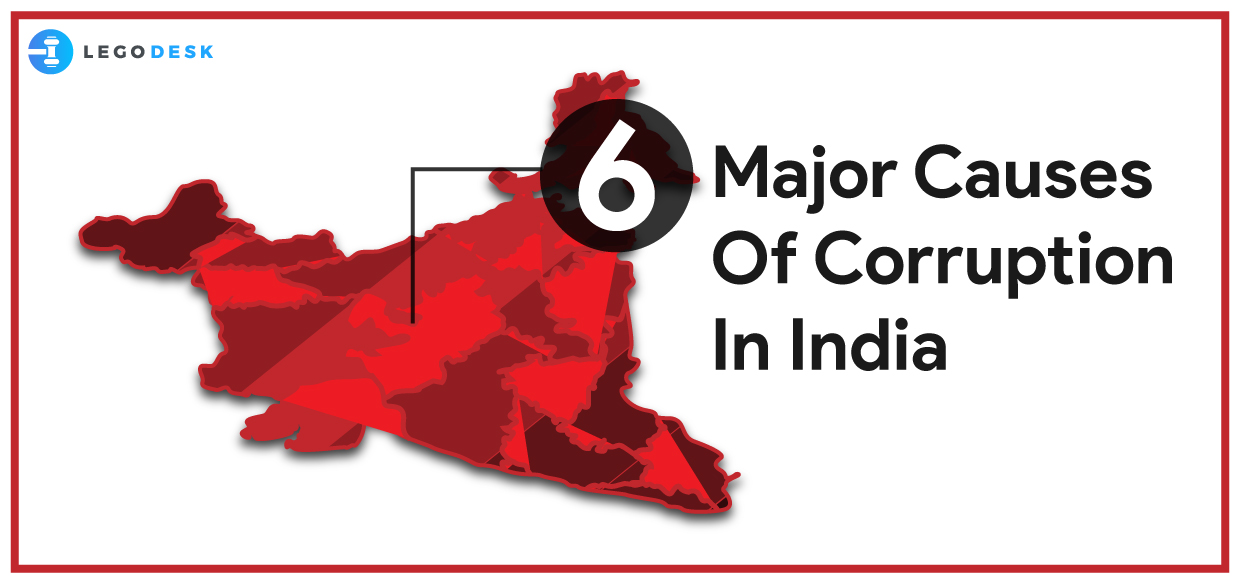
Corruption is a massive problem in India. It is perhaps the single biggest problem of this century. It is a hurdle towards the effective functioning of a healthy democracy such as ours. India is ranked at the 78th place out of 180 nation according to the Corruption Perceptions Index,2018, reported by Transparency International. The word corruption refers to destruction, degrading or spoiling the society or the country. Selfishness and greed are the main contributors. Lack of honesty and integrity is also reflected among corrupt people.
Read Also: Know the Difference between bribery and corruption
6 major causes of corruption in India
A consensus has now been established that corruption is a worldwide phenomenon. It exists in all countries, whether developed or developing, in the private and public sectors and the non-governmental and charitable organizations. Allegations of corruption have now become a significant part of the political atmosphere more than anywhere else. The growing trend of using bribery as a tool to discredit political opponents and the media’s tool to use the same as a highly marketable commodity has become so common. Along, with that corruption is a significant obstacle in the process of economic development and modernization.
Keeping these in mind, here are six major causes of corruption in India –
- Lack of effective management and organization
Due to lack of proper management and poor organization, respective departments are malfunctioning. This leads to coordination and control failure among the departments and levels of the organization. This uncontrolled and unsupervised administration leads to corruption. Besides that, the appointment of inefficient and incapable managers and executives on various levels of the hierarchy also leads to mismanagement. Therefore, the only cause of wrong appointments is corruption. Hence, corruption breeds corruption.[1] - Lack of economic stability: Economic crisis and hike in price are significant reasons for corruption in India. This leads to unemployment and a change in the lifestyle of people. It further develops a feeling of insecurity in the minds of the people, especially the poor. Most people cannot face this terrible situation and to employed and to maintain a decent standard of living these people take recourse to illegal and immoral activities. Due to their past experiences, they deny working hard again and instead make various irregular short cuts for achieving their goals.[2]
- Lack of values: When it comes to values, it has to be the grooming done by the family and the school. Home and educational institutions play a significant role in molding the character of an individual. Lack of moral values taught in the early years of childhood could lead to corrupt children because children imitate their parents. If the parents are corrupt, then it is most likely that the child will also become corrupt. [3]
- Lack of good control and vigilance: In India, some agencies day in and day out to prevent corruption. There are several anti-corruption laws too. Some officials of these agencies get tempted towards illegal commissions and leave corrupt people without a penalty or punishment. Honest officials are required, and more such agencies must be established. [4]
- Elections: The time of elections, be it the Lok Sabha or the Vidhan Sabha, corruption is at its peak during this time. Prominent industrialists fund politicians to meet the high costs of elections and ultimately seek personal favor. Bribery to politicians gets to influence, and bribery by politicians gets votes. To get elected, politicians bribe the poor and the illiterate.[5]
- Lack of decent remuneration: In the private sector, employees gets the final call on deciding the salary and the benefits of employment. He has complete autonomy and has no pressure from the government. Due to this reason, many employers pay less for more work, which is a classic example of the capitalist mode of production. Even if they work to their fullest, the employers make the most money and exploit the working class or their employees. Employees get frustrated and adopt illegal means to make their earning better and their future secure. [6]
CONCLUSION
Corruption occurs not just in India but everywhere in the world, especially in places where the risk of getting caught is low and the rewards are high. It is not a matter of whether it is unlawful or illegal but a question of personal integrity and dignity. It is unethical to hoard money and gain an advantage by wrong-doings. It results in social inequality, widens the gap between the rich and the poor, makes the administration slow and makes the country shameful in the eyes of the world. It is vital for the people of India to realize that what starts as greed and selfishness turns into corruption one day. Apart from the remedies suggested above, the mindset of the people has to change, and the people themselves can only do that. There is no medicine, no book that can teach the same to them. The root of greed and selfishness must be eradicated from their brains.
Read Also: How Corruption in India Can be Stopped
Watch this: What causes corruption in India?
[1] Wasi Arman, Causes, Consequences, and Cures of Corruption in India India Study Channel (2011), https://www.indiastudychannel.com/resources/137016-Causes-Consequences-and-Cures-of-Corruption-in-India.aspx (last visited May 11, 2019).
[2] Ibid
[3] Ibid
[4] Ibid
[5] Jeevan Singh Rajak, Corruption in India: Nature, Causes, Consequences and Cure, 18 IOSR Journal Of Humanities And Social Science 20–24, http://www.iosrjournals.org/iosr-jhss/papers/Vol18-issue5/C01852024.pdf?id=8650.
[6] Wasi Arman, Causes, Consequences, and Cures of Corruption in India India Study Channel (2011), https://www.indiastudychannel.com/resources/137016-Causes-Consequences-and-Cures-of-Corruption-in-India.aspx (last visited May 11, 2019).

